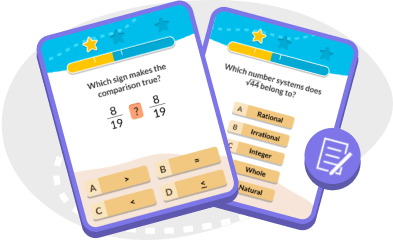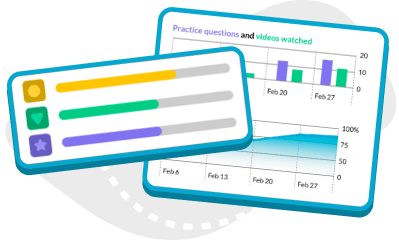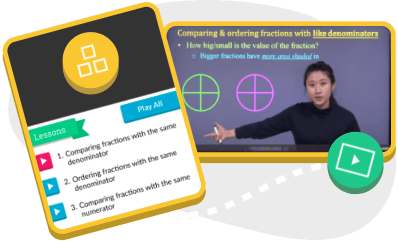Master Year 6 Maths
Video lessons that improve understanding and boost grades
Try Our Year 6 Maths Practice Test

📈
One letter grade improvement
✨
75% homework completion rate
💡
Less maths anxiety at home
📚
85% master multiplication skills

Clear Video Lessons
Step-by-step videos for every concept

Matches School Work
Follows exactly what's taught in UK classrooms

Guaranteed Results
Most students improve one letter grade in 4-6 weeks
...read more
...read more
...read more
...read more
...read more
...read more
...read more
...read more
...read more
...read more
Year 6 Maths Topics
Understanding Numbers
Number Theory
Adding and Subtracting Integers
Multiplying and Dividing Integers
Operations with Decimals
Adding and Subtracting Fractions
Multiplying and Dividing Fractions
Rates and Ratios
Percents
Patterns
Introduction to Variables and Expressions
Data and Graphs
Introduction to Probability
Measuring Systems
Coordinates, Quadrants, and Transformations
Angles, Lines, and Transversals
Properties of triangles
Symmetry and Surface Area
Introduction to 3-dimensional figures
What is Key Stage 2 Maths?
Key stage 2 maths is the term given for the 4 years you spend learning maths in primary school. It covers the maths taught in years 3, 4, 5 and 6. Typically, students who study key stage 2 (KS2) maths are between the ages of 7 and 11.
Towards the end of KS2, year 6 students will sit national curriculum maths tests known as SATs (Standard Assessment Test). Unlike the tests throughout the year, these will be marked externally and the results are published in cthe Department for Education performance tables.
The structure of KS2 maths will be the same across all schools in the UK, as they all follow the same national curriculum. The aim of KS2 maths is to develop your understanding of the basics within arithmetic and reasoning, preparing you for future study at secondary school.
In Year 6, your KS2 maths classes will cover the following:
- Adding and subtracting fractions
- Multiplying and dividing fractions
- Long multiplication
- Place value
- Rotational symmetry
- Multiplying and dividing decimals
- Common factors
- Surface area and volume of prisms
- And more
If that sounds like a lot, don't worry! StudyPug covers each of these topics and we've broken them down into easy to follow video lessons that provide simple explanations to even the trickiest year 6 maths questions.
Our experienced tutors have crafted the year 6 content to meet your KS2 maths curriculum. The videos cover all of the same topics you'd expect to cover in class, and we also make sure that our videos cover the content found in modern maths textbooks like Mathematics Year 6 by Galore Park and Abacus Year 6 Textbook 3.
Many of our students prefer the video format over traditional textbook revision. They find it more engaging and user friendly with tutors that are able to break difficult maths problems into plain english.
How Many Maths Tests Within Year 6 SATs?
In your KS2 SATs, you will sit a total of 3 maths papers. The 1st paper will be a 30 minute arithmetic paper. Papers 2 and 3 will both be focused on reasoning, and you'll have 40 minutes per paper.
The questions in Paper 1 will be made up of fixed response questions. This means that you'll need to work out the answers to various calculations, such as division and long multiplications.
The second and third paper will be slightly different. These papers will involve different forms of questioning in which you may be asked true or false questions as well as multiple choice questions. You will still have questions that require you to answer calculations and you can expect questions that will ask you to draw specific shapes or to complete a chart/table.
You should also expect to face questions that require you to explain how you would approach a problem and find the solution. This tests your reasoning and assesses your mathematical understanding beyond memorization.
How Can I Pass Year 6 Maths?
The best way to secure a pass in year 6 maths is to pay attention in class. As we'll explore below, the end of year tests will assess your learning, so if you don't listen in class, you won't learn, and you may end up failing. Additionally, listen to your teacher and try your best to avoid distractions like smartphones and your friends.
If you're having trouble in class or find that you don't understand something, ask your teacher for help. There's absolutely nothing wrong with taking ownership of your learning, so don't be embarrassed! There's a good chance that your classmates are just as confused as you are. Don't wait for them to ask the question though. Asking for help will greatly benefit your learning and in turn will help you in your exams too.
To successfully pass your year 6 SATs, you'll have to be able to confidently show the examiners that you possess strong mathematical reasoning abilities. This means that you can evaluate problems and are able to find the most effective way to solve them.
They're essentially testing you to see what you've learnt whilst at school. Beyond the right answers, examiners want to see your working out and will be more interested in how you arrived at the answers. Your working out and showing your thought process will allow them to assess your understanding of the problem.
To improve your chances of passing, you should be taking notes in class and assessing where your strengths and weaknesses lie. Outside of the class notes, you can use online maths quizzes, and past KS2 SATs papers to test your knowledge.
When sitting these past papers, try your best to work within the time constraints of each paper. This will help you manage your time more effectively in your real exams. If you struggle with a question, move on and get to it later. You don't want to run out of time and miss questions you could have answered.
Is Year 6 Maths Hard?
You may find certain aspects of year 6 maths to be a bit challenging at times. This is to be expected though as you'll be introduced to new areas of maths. The skills and knowledge learned here will better prepare you for further study at secondary school. Many students across the UK find this transition a little difficult. Understandably, it seems like a daunting prospect, but if you have a firm grasp on the basics, you shouldn't find it too difficult.
If you do come out of class feeling confused, or perhaps you've missed a lesson or two, jump online and watch our online maths revision videos. We have a video for every topic within KS2 maths, and our step-by-step examples explain everything in plain English, which makes learning maths less stressful and more enjoyable.
To help get you started on your year 6 maths quest, we have provided a selection of free lessons that cover ratios, fractions, angles, and more. You can find our free lessons within the topics section of this page.
Explore
